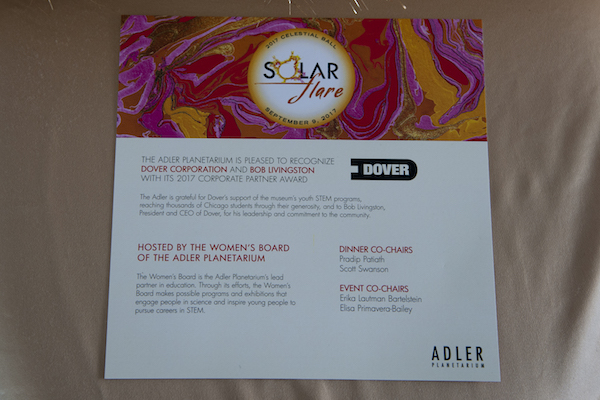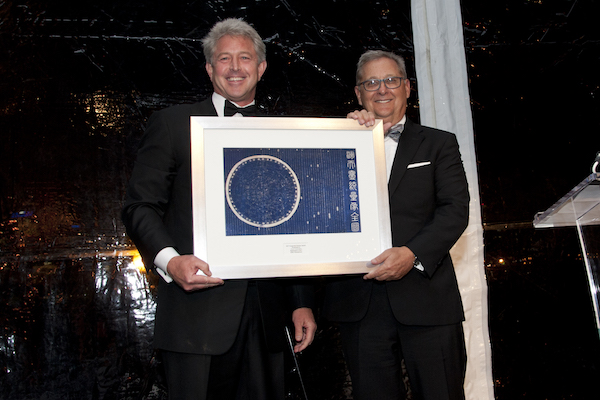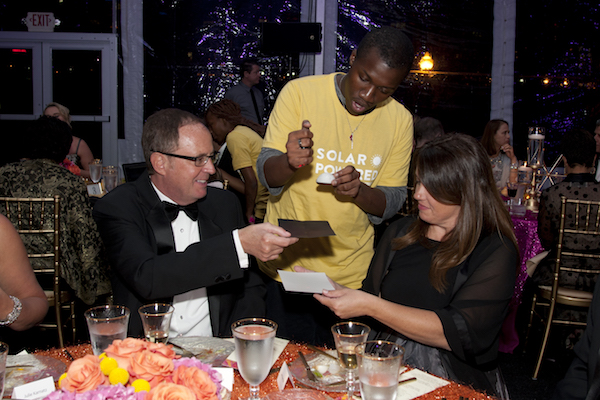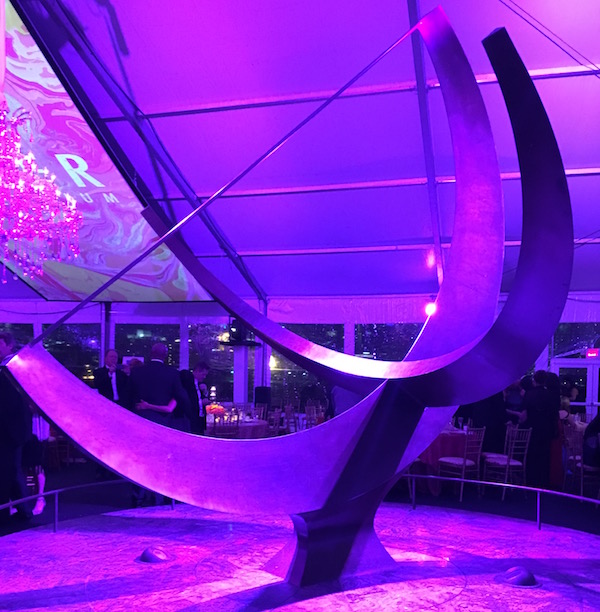Fundraising galas are a great opportunity to pull out your best formalwear, meet amazing people, and support a fantastic cause — like inspiring future scientists, engineers, and mathematicians.
That’s exactly what took place this past weekend at Chicago’s Adler Planetarium, the oldest planetarium in the Western Hemisphere and, to me, the very model of modern and engaging public science programming. I grew up in a south suburb of Chicago and went there often when I was younger. And now, I’m learning just how involved a leader the Adler is in inspiring kids in local communities to not only look toward the skies, but also toward a future in the fields of science, technology, engineering, and math (also known as STEM fields).

The Adler Planetarium overlooks Lake Michigan and the Chicago skyline; it is the oldest planetarium in America. // Photos courtesy of the Adler Planetarium & Robert (Bob) Carl
Those fields were at the forefront of Saturday’s gala: the 2017 Celestial Ball: Solar Flare. The Celestial Ball is an annual event hosted by the Women’s Board of the Adler Planetarium. It is their largest fundraising event of the year. This year marked the most successful Celestial Ball to date: approximately 600 guests attended the ball, which raised $1.7 million by evening’s end to fund educational programming designed to bring science to the public, whether by encouraging communities to engage in science observation and experiments or by inspiring students to consider and pursue careers in STEM fields. The Adler was generous enough to invite me among their media guests, allowing me a firsthand look at the importance placed on their youth programs and to meet the dedicated people behind their funding.
A unique fundraising experience

This year's Celestial Ball recognized Dover's generous support.
Guests arrived to a cocktail reception in the Adler Planetarium’s Solarium, a beautiful glass-enclosed space that overlooks Lake Michigan and much of the iconic Chicago city skyline. As they mingled, enjoyed drinks and hors d'oeuvres, and perused the prizes and gifts available for silent auction, attendees also watched the transition from day to night as twilight fell over the city and shoreline.
Dinner included beautiful place settings at more than 50 tables, each of which enjoyed an opportunity not available anywhere else: interactive tableside science demonstrations with the planetarium’s “Science Sommeliers” teen volunteers. Such a unique experience not only shows guests firsthand the benefits of Adler’s STEM programs, but also allows these teens to share their enthusiasm for science and the knowledge they’ve gained. This year’s demonstrations were, appropriately, eclipse-themed, and included models of the Moon that the students had created and 3-D printed. (Not only were these models accurately printed based on lunar maps, they also glowed in the dark!)
As the meal wound down, the planetarium presented its 2017 Corporate Partner Award to the Dover Corporation; Dover’s president and CEO, Bob Livingston, accepted the prestigious award on the company’s behalf. Dover, through its Dover Foundation, provides generous support for numerous local institutions that include the Adler Planetarium. Funding from Dover has made opportunities such as Operation Airlift, Astro-Overnights, and Adler Teen Leaders Advancing STEM (ATLAS) possible. These programs have reached thousands of young people in the Chicago area in the past two years alone.
Adler CEO Michelle Larson also spoke about the overwhelming generosity the planetarium has received from donors, volunteers, and staff. She highlighted some of the planetarium’s recent accomplishments, including its ‘Scopes in the City program (which has brought the sky down to Earth for more than 2,000 people each year by taking telescopes to 25 Chicago communities) and the crowd of 60,000 people who visited the museum’s campus during the solar eclipse August 21st.

Scott Swanson presents Dover president Bob Livingston with Adler's Corporate Partner award.
The post-dinner crowd donated generously to numerous ongoing Adler programs, ensuring these opportunities will continue to touch the lives and minds of Chicago children in future. As someone fortunate enough to pursue my own interests in science, as well as who believes that science outreach and education are vital to our future, I felt humbled, amazed, and hopeful as the donation totals climbed ever higher. Every dollar donated that night will go toward showing students not only the importance of science and technology in our society, but also how they can become active participants in these fields, today and tomorrow.
After dinner, the gala’s guests enjoyed drinks, dessert, and dancing in the Solarium. The Grainger Sky Theater was transformed into a low-key jazz lounge, where I admit I spent quite some time enjoying music amidst the stunning astronomical backdrops projected inside before the evening wound down to a close.
Catching STEM excitement
Regardless of the glitz and glamor of this black-tie fundraising gala, the heart of the Celestial Ball is a simple but powerful concept: If you inspire the young people of today by making science exciting, engaging and accessible, they will take that inspiration and do great things with it, to their own benefit and the benefit of others.

Adler's Science Sommeliers are enthusiastic teens ready to share their knowledge.
Especially because, studies are showing, those students will in turn inspire their peers’ interest in science, technology, engineering, and math. The title of a paper recently published in Science Advances says it all: “Interest in STEM is contagious for students in biology, chemistry, and physics classes.”
This work found that students who perceived their peers as interested in subjects such as biology, chemistry, and physics in high school were more likely, once in college, to pursue STEM-related courses.
What does this really mean? Two things: First, inspiring and guiding students’ interest in the sciences needs to start in high school or, more ideally, before. And second, every dollar, piece of equipment, or hour of time donated toward promoting STEM education can provide amazing returns. The “contagious” nature of STEM interest means that reaching a single student can in turn fill college classrooms and majors with individuals interested in pursuing a career in the sciences, whether as an astronomer, a biologist, a mathematician, a programmer, or an engineer. These (and more) are the fields that will drive the future, and inspiration can come from anywhere — including, as the Adler and Dover are showing, local museums and community-minded companies.
What has continually struck me about the Adler is not only the amount of outreach they do, but the type of outreach they are doing as well. Inspiring and encouraging the public to love space is part of the Adler’s mission. And it doesn’t just approach this mission as one that can be achieved through exhibits and sky shows (amazing though they are), but as one that requires the active development and administration of projects, programs, and opportunities for children and their families. Opportunities such as their teen programs are definitely a big part of it, but other projects like Zooniverse are also making huge contributions to current science and even revolutionizing the way people do science.
The Adler can’t do it alone; but, as I saw on Saturday, they don’t have to. The generosity and support of individuals, families, organizations, and companies is helping the Adler Planetarium create and maintain community resources that will continue to inspire future generations of scientists, explorers, and many others willing to ask questions, pursue answers, and encourage those around them to do the same.

The Adler's iconic sundial was incorporated into the dining setup at the ball. // photo: Astronomy: Alison Klesman
Before I close, I want to add — if you’re an Illinois resident, the Adler Planetarium is offering free general admission with an Illinois ID this week through September 17, 2017. Additional ticket purchases are still required for shows, but if you’re looking for a great week to explore America’s oldest planetarium at low or no cost, this is it!